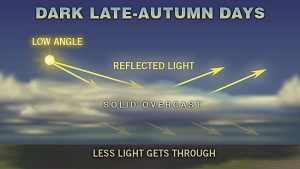Is it possible that poor weather, especially seasons of poor weather, such as the rain and snow of fall and winter, can cause depression in otherwise happy people? Seasonal Affective Disorder , otherwise known as SAD, is a disorder in which a patient experiences mood shifts beginning in the fall which last through the winter. SAD is completely dependent upon the weather of the cold seasons and reoccurs each year for those affected. Symptoms of SAD include, but are not limited to, feelings of depression, little to no energy, hopelessness and agitation. In some cases, sufferers of SAD can become so depressed they experience suicidal thoughts.
Despite the seemingly direction correlation between the weather and SAD, is this enough to declare causation? Many scientists argue no, the weather alone is not enough to entirely depress the average human. In fact, there are several other outside factors which must be considered in such a hypothesis. Jaab Denissen , a psychologist from Humoboldt University, preformed an experiment in which he studied three different moods: negatively affected moods, positively affected moods and tiredness in an individual. Denissen then chose six weather factors to study to see how each condition would affect the three selected moods. Denissen decided to focus in on: sunlight, wind power, photoperiod, air pressure, precipitation and temperature. After a period of experimentation, the results found that the weather conditions have very little effect on the moods of the studied humans.
The interesting aspect discovered in Denissen’s experiment was that there was however a considerable connection between sunlight and energy. In a study done by Kelly Rohan , a professor of psychology from the University of Vermont, it is the lack of sunlight in the off seasons that cause shifts in mood. The rain or snow alone cannot cause such major shifts. As it gets colder, rainier and snowier as the winter approaches, it is important to remember the days themselves get shorter. It is this factor that can cause disorders such as SAD, not the weather. The less sunlight one is able to soak in, the less serotonin one is able to take in and thus the less energy one is able to experience. On a more obvious level, the darker it gets in the morning—the harder it is it to get out of bed. Whether it is raining or not, the darker it is, the more difficult it is for humans to get up and begin their day.
In another study , done by Wallethub Best & Worst, scientists found that there is a correlation between weather and health which may in turn affect mood, once again proving that the rainy weather alone does not have an impact on mood, but that several other factors are affected which in turn may have an effect on humans. Change in weather, especially poor weather, can cause health issues in people such as, but not limited to, respiratory complications, headaches and changes in blood pressure. Such health conditions, caused by poor weather, in turn can affect a person’s mood as he or she may find oneself in discomfort, agitated and inconvenienced by the health complications. The rain itself does not have a direct affect on mood in most people.



I really like the distinction you made between correlation and causation in this blog. I found it interesting that it was not the weather itself that was effecting moods but rather the lack of sunlight that produced less serotonin (in turn, less energy). I always thought that a gloomy day meant that my day would be gloomy and I would not enjoy my day right off the bat. I suppose people that think this way are just setting up themselves for disappointment in that way because the rainy days do not directly impact moods.
Coming from Southern California, I am constantly in the sun, where very few rainy or cloudy days exist. On the days where the weather does decrease I find myself, along with all my friends, feeling as though all we want to do in lay in bed all day and not go outside. Maybe for people with SAD, getting artificial sunlight could be beneficial in diminishing the depressing effects of the the lack of sunlight.
I definitely see this effect on many people, especially our area where the weather is usually pretty bad throughout the year. I myself find that I am different when the weather is bad. I am more tired, lazy, and get aggravated easily. I did’t know they actually coined a term for this behavior. But it sure does explain why everyone in the south seems to be friendlier and happier. I like the different studies you researched and included into this post and definitely kudos to pulling out some vocabulary from the class, i.e relating the bad weather to cause depression is a correlation but as you said not a causation.
I definitely see this effect on many people, especially our area where the weather is usually pretty bad throughout the year. I myself find that I am different when the weather is bad. I am more tired, lazy, and get aggravated easily. I did’t know they actually coined a term for this behavior. But it sure does explain why everyone in the south seems to be friendlier and happier. I like the different studies you researched and included into this post and definitely kudos to pulling out some vocabulary from the class, i.e relating the bad weather to cause depression is a correlation but as you said not a causation.
Haley- this is really interesting! One of my best friends actually suffers from SAD so this helps me understand what shes going through. I never had really thought about whether or not it was the weather that changes mood or if there were other factors that went into it. Thanks!